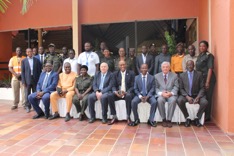
Speaking at a two-week intensive training for government stakeholders on Risk Management on Wednesday, Mr Darboe stated that the Customs and Excise Department, being a key revenue collector of The Gambia, effectively allocates resources to meet its statutory obligations to government and to the community.
This, he added, is in accordance with the Kyoto Convention Guidelines on Customs Control for Risk Management and internationally accepted standards of the WTO/WCO Trade Facilitation Agreement.
The training, funded by French Development Agency with technical experts from the UK, brought participants from GPA, SIS, Food Safety and GRA among other government stakeholders.
Mr Darboe noted that generally, customs authorities are responsible for the implementation of a broad range of government policies in areas as diverse as revenue collection, trade and traveller compliance, protection of society, cultural heritage, intellectual property, collection of statistics and environmental protection among host of others.
According to the GRA boss, in The Gambia, risk management is basically on two principles: the changing customs operational environment, and the need to adopt its compliance management risk-based approach in customs operations.
He cited that in addition to the maintenance of control, customs authorities have the mandates to provide an appropriate level of facilitation to trade and travel in a way that reduces the impact of intervention.
He further stated this change of operating environment has meant that the Authority needs to keep the amount of intervention necessary to achieve policy outcome and also ensure that regularities requirement (red tape) are not unduly overly prescriptive.
He stated that the background of risk management in customs administration evolve as a result of the changing customs operating environment, and the need to adopt a compliance management risk based approach to customs operations.
“The manner in which goods are carried and traded, the speed of such transactions and the sheer volume of goods that are traded around the globe has changed dramatically,” he said, adding that as a result of these changes, administrations around the world have been impacted and required to continually adapt their methods of operating in an efforts to maintain their effectiveness and relevance.





